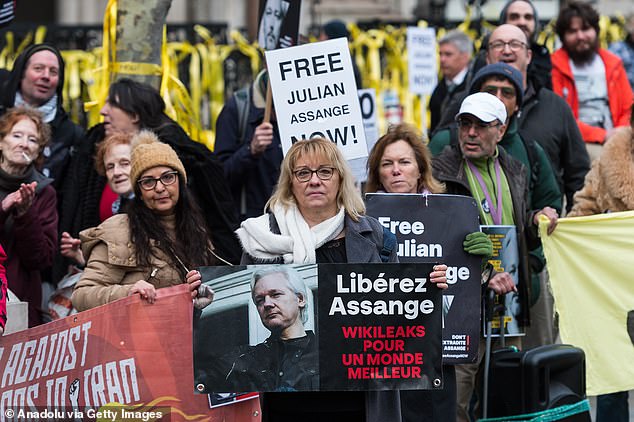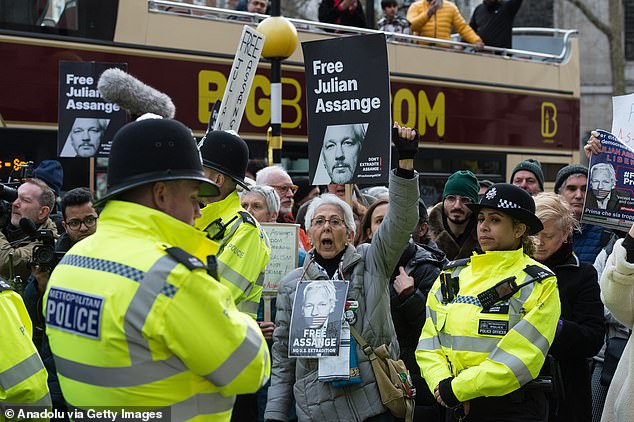Julian Assange could be sent to the United States to face espionage charges within weeks, activists said yesterday as a final court battle to block his extradition began.
Lawyers for the Wikileaks founder told the High Court he faced politically motivated prosecution in the United States that would amount to a “flagrant denial of justice.”
They said the espionage charges against them were an unprecedented attempt by Washington to “criminalize journalism” in retaliation for Wikileaks’ publication of thousands of leaked documents related to US conduct in Iraq and Afghanistan.
Assange could face a possible “grossly disproportionate” prison sentence of 175 years if convicted, and could even face the death penalty if more charges are brought, his lawyers said.
Donald Trump’s White House previously considered plans to kidnap or even assassinate the Wikileaks founder after a senior security official accused him of “waging cyber war against the United States”, the court heard.
Assange, 52, is fighting extradition to the United States, where he faces espionage and hacking charges over an alleged conspiracy to obtain and publish hundreds of thousands of leaked documents and diplomatic cables related to the wars in Afghanistan and Iraq.
His lawyers said he had exposed “criminality by the US government on an unprecedented scale”, including torture and war crimes, and claimed that the US prosecution was actually “state retaliation”.
This week’s appeal to the High Court is Assange’s last chance to convince British courts to block the extradition.
Julian Assange gestures to the media from a police vehicle upon arrival at Westminster Magistrates’ Court on April 11, 2019.

Stella Assange, the wife of Julian Assange, addresses supporters outside the Royal Courts of Justice in London.

Supporters of Julian Assange demonstrate outside the Royal Courts of Justice on the first day of Assange’s final appeal hearing.
If he fails, he will be extradited within a month, unless his legal team can convince the European Court of Human Rights to intervene.
Australian-born Assange was given special permission to attend the two-day hearing, but his lawyers said he was too ill to be in court, or even to watch the proceedings via video link.
He has been held in the high-security Belmarsh prison for almost five years and previously spent seven years living inside the Ecuadorian embassy in Knightsbridge, west London.
His wife Stella Assange said his health had deteriorated during his time in prison. She addressed crowds of the president’s supporters who gathered outside the High Court building, chanting “Free Julian Assange.”
She told them: ‘You are here because the world is watching. They just can’t get away with it. Julian needs his freedom and we all need the truth.
Referring to Russian opposition leader Alexey Navalny, who died in prison last week, he said: “What happened to Navalny can happen to Julian, and will happen to Julian if he is extradited.”
Assange’s lawyers told the court that Britain’s treaty with the United States meant it did not extradite people accused of political crimes.
Edward Fitzgerald KC, for Assange, said: ‘We assert that the prosecution is politically motivated. Mr. Assange was exposing serious state criminality and such exposure is a protected activity.” He continued: “Mr Assange, we say, is being prosecuted for engaging in the ordinary journalistic practice of obtaining and publishing classified information, information that is both true and of obvious and important public interest.”

Police wait as protesters in London demand Assange’s release
Fitzgerald said senior US officials had previously claimed that Assange’s alleged activities amounted to treason, which can carry the death penalty.
Assange’s legal team asked judges to consider an alleged CIA plot to kidnap or kill Assange while inside the Ecuadorian embassy, which was allegedly overseen by ‘the highest levels’ of the Trump administration in 2017. .
Fitzgerald said the possible return of a Trump administration meant there was a renewed risk of an “extrajudicial attack” on Assange.
The Wikileaks founder was unable to have a fair trial in the US due to public comments about him by Trump and other senior officials, which meant any juror would be “irremediably prejudiced by the public allegations against him”. [Assange] done by the President downwards,” he told the court.
Former US Secretary of State Mike Pompeo called WikiLeaks “a hostile non-state intelligence service”, and Trump has previously called for Assange to face the death penalty.
Assange has been fighting extradition for more than a decade. A district judge previously ruled that he should not be sent to the United States because of the risk of him committing suicide, but his decision was successfully challenged by US authorities.
They argue that he should be tried in the United States for Wikileaks’ publication of leaked documents in 2010, which they say endangered “the strategic and national security interests of the United States and seriously endangered the safety of the people.”
The hearing continues.

